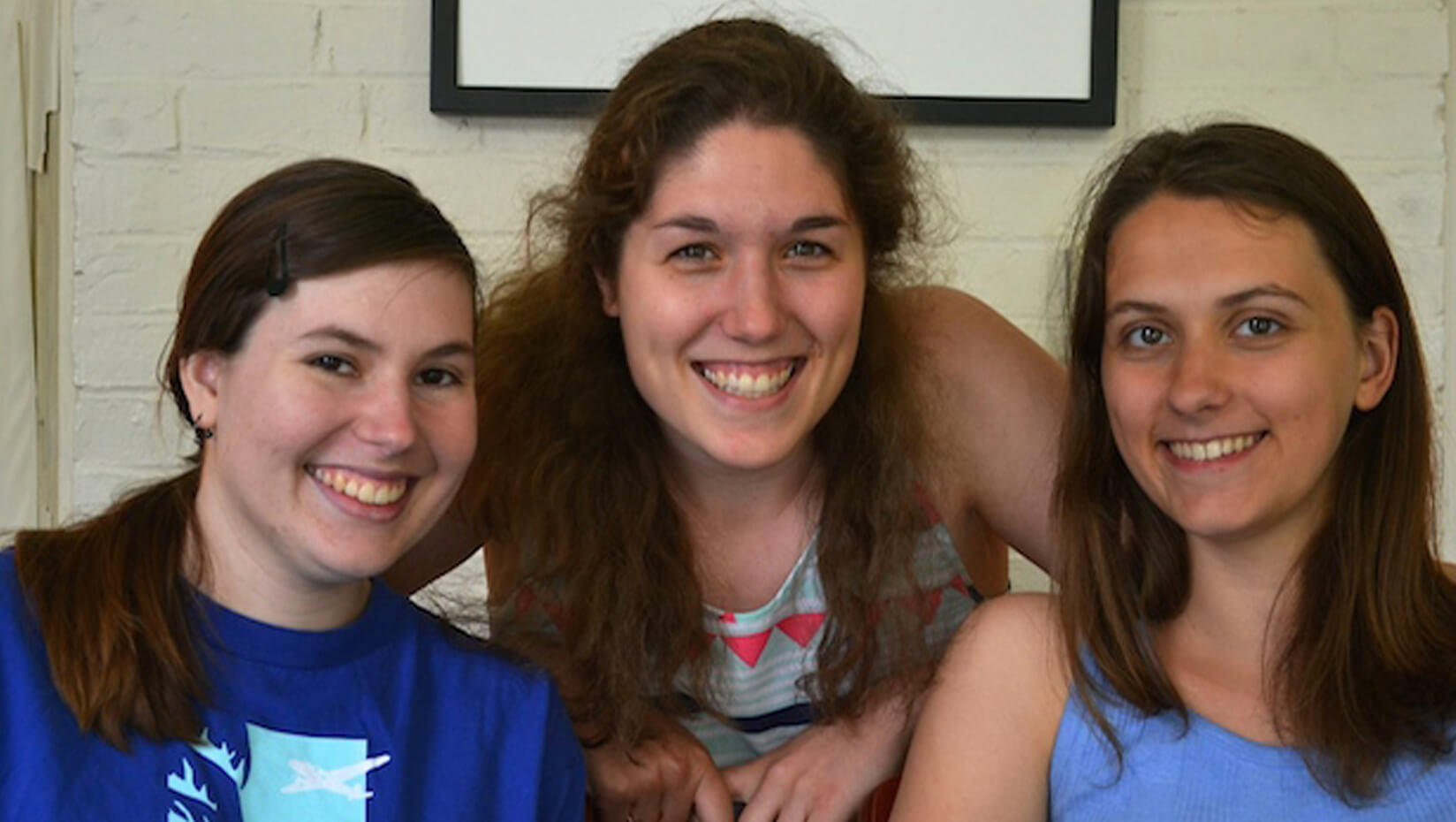
Audrey Cross, Ashley Thibeault and Danielle Walczak: Collaborative Researchers
University of Maine Honors College undergraduates Audrey Cross and Ashley Thibeault tracked all of UMaine Dining’s food purchases for several months last year; they tracked everything from mayonnaise to sushi-grade tuna. Then they crunched the numbers, noting the percentage of food purchased from local producers.
They discovered that UMaine stacked up well against other universities with 15 percent of all food coming from local sources dedicated to sustainable practices. They reported their findings in a poster presented at the Maine EPSCoR State Conference in December.
“We want to see if we can get the university to commit to a goal of 20 percent by 2020,” says Cross, a junior, whose work is based on the Real Food Challenge — a national student movement to create sustainable food goals. “Where our food comes from means something. We want students to get in the habit of thinking that way, so after they graduate they can’t go back to, like, the ambiguous tomato.”
The research and analysis were made possible by grants from a new initiative of UMaine’s Honors College. The Sustainable Food Systems Research Collaborative (SFSRC) brings together students, faculty and community partners to enable an interdisciplinary approach to solving problems of food production and distribution, as well as hunger. SFSRC faculty also see a broader role for the collaborative as a center for innovative solutions to multiple aspects of food systems: social, cultural and economic, as well as physical boundaries and personal challenges. Students of any major are welcome and encouraged, faculty say.
Cross and seniors Thibeault and Danielle Walczak are the first fellows of the program, which received seed funding from the Senator George J. Mitchell Center for Sustainability Solutions. The fellowships allowed each student to expand their food-systems-related senior theses, granting them access to a network of faculty and community partners such as farmers and food service professionals. The grant also gave them time to dedicate themselves exclusively to the work for a month following last year’s spring semester.
The idea, say faculty affiliates, is to build a rich collaborative that includes undergraduate students at all levels, university researchers and a network of invested community partners. New lines of inquiry will build on previous students’ work, making it possible to identify common factors and guiding principles that underlie studies in a variety of disciplines.
“Working together the group leverages the multiple disciplines of the participants to generate a broad view of the food system landscape before individual members take on specific projects,” says Francois Amar, dean of the Honors College. “The energy and enthusiasm of the first fellows has been incredible. In addition to wanting to focus on their own research problem or thesis topic, they were very open to reading and discussing articles and meeting with stakeholders who had broader concerns. Undergraduates are not yet fully integrated into a research discipline and so can often be very open to hybrid approaches to solving problems.”
Amar and colleagues say the research collaborative was born after they realized students such as Cross, Thibeault and Walczak were duplicating efforts.
“My colleagues and I realized that a number of students were working on research related to the food system, but were doing so mostly in isolation,” says Melissa Ladenheim, adjunct assistant professor in Honors and interim coordinator of advancement. “The support from the Mitchell Center allowed us to create a nerve center where we can coordinate these efforts. The collaborative fosters continuity in relationships and research that encourage students to engage in meaningful projects with real implications for our community partners.”
For Walczak that meant spending a lot of time on farms last year rather than cloistered in a library. Walczak, who is researching small Maine farms, met with several young farmers to assess their food production, business acumen and community connections.
Her goal is to understand their lives, which mainly involve small, diversified livestock and vegetable production, and what their contributions mean to the state. She discovered that, despite Maine’s aging population, young farmers who own small farms are on the rise. A journalism major, Walczak laid out her discoveries in a piece of literary journalism, outlining the struggles facing these new farmers such as land acquisition, availability of markets, climate change and capital.
“There are successes, but I’m interested in looking behind the statistics and getting the real story: What are the struggles facing these farmers? What makes them tick? SFSRC has allowed me to be really thoughtful about my process and how I set up my project. I was able to discuss ideas and engage in a place-based approach toward our food system,” she says.
Amar sees the year-old collaborative growing far beyond its current incarnation. And though building a large database of original research will require the work of multiple students over several years, the collaborative is gaining attention. The SFSRC team gave a presentation on its model at the National Collegiate Honors Council meeting in Denver in November. The talk attracted interest from faculty and students. Next up is a session on food systems at the 2015 Maine Sustainability and Water Conference in March.
SFSRC, says Amar, has potential implications beyond UMaine.
“Tailoring community-based research to undergraduates is novel and, I think, may be transportable to other complex problems and other institutions,” he says.
